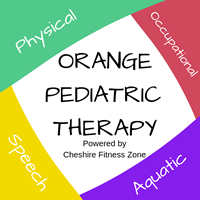Pediatric Feeding Therapy Services
We work with babies, toddlers, children, and adolescents
Our feeding team, comprised of Speech Language Pathologists and Occupational Therapists, apply principles from advanced training (Sequential-Oral-Sensory “SOS”, Beckman Oral Motor, etc) to evaluate and treat patients with feeding concerns. We work with toddlers, children, and adolscents who experience difficulty with acceptance of new foods/textures, commonly referred to as “Problem Feeders”, patients who have feeding disorders, known as dysphagia, as well as mother’s with difficulty breastfeeding.
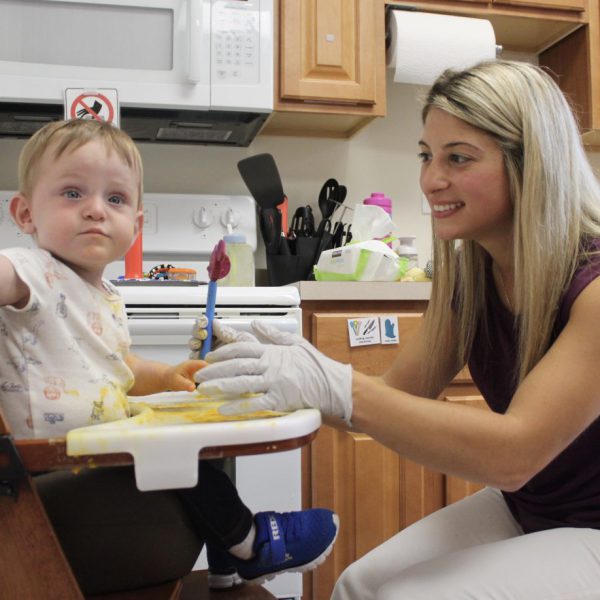
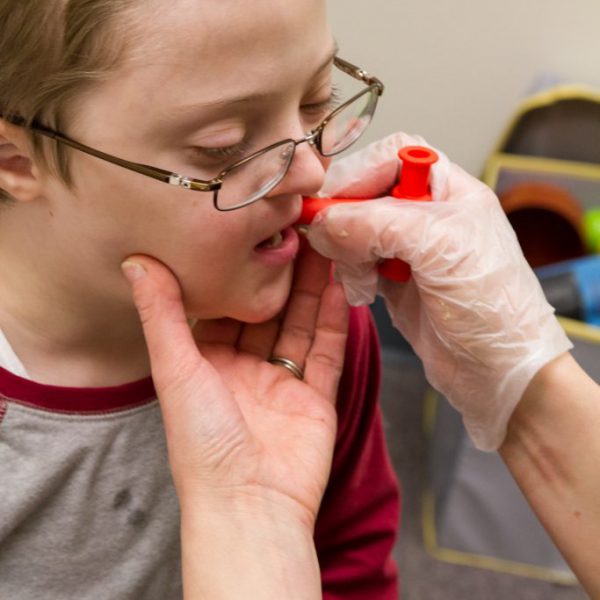

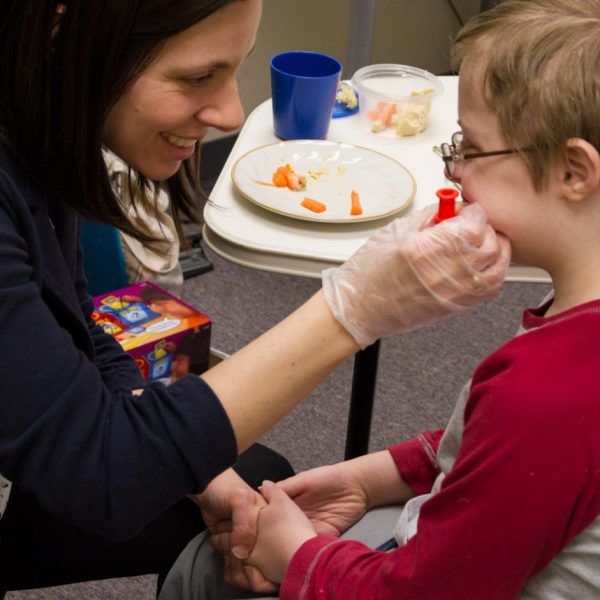
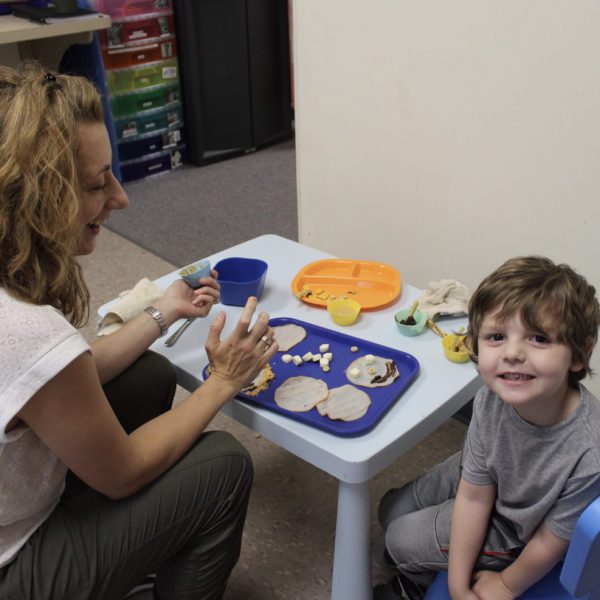
Learn more about problem feeders, dysphagia and lactation counseling
Children who require professional feeding intervention demonstrate concerns beyond being picky. Many children prefer certain foods and can be stubborn when new foods are presented. Problem feeders present with signs/symptoms that are much more severe such as:
- Diet consisting of less than 20 foods
- May lose foods that were once accepted and do not reacquire them
- Refuse foods even when hungry
- Demonstrate behaviors (crying/tantrums/withdrawal) associated with eating or just being in the presence of food
- Unwilling to try new foods after many presentations
Dysphagia can occur at different phases including oral, pharyngeal and esophageal. Our therapists specialize in treating oral phase dysphagia which includes sucking, chewing, controlling food inside the oral cavity and moving food or liquid into the throat to successfully swallow.
Some signs/symptoms that may be exhibited due to oral phase dysphagia may include:
- Food or liquid leaking from the mouth
- Food or liquid scattering in the mouth
- Pocketing food inside the cheeks
- Reduced sensitivity- Difficulty feeling food and therefore cannot control it
- Difficulty chewing due to weaknesses in oral musculature
Breastfeeding provides a mother and baby with best possible nutrition and several other health benefits that begin from the moment of birth. When encountering difficulty, we are able to provide Certified Lactation Counseling services. Combined with training as feeding therapists, we are able to assess and treat a variety of concerns related to latch, milk production, oral motor skill, muscle tone, and positioning, all of which may be impacting the breastfeeding process.
Once your baby is here, we can help if you or your newborn are:
- Experiencing a painful latch
- Difficulty maintaining a latch
- Showing limited weight gain
- Fussy or discontent following a feed
What causes feeding and swallowing disorders?
The following are some causes of feeding and swallowing disorders in children:
- nervous system disorders (e.g., cerebral palsy, meningitis, encephalopathy)
- gastrointestinal conditions (e.g., reflux, “short gut” syndrome)
- prematurity and/or low birth weight (history of intubation or feeding tube)
- heart disease
- cleft lip and/or palate
- conditions affecting the airway
- autism
- head and neck abnormalities
- muscle weakness in the face and neck
- multiple medical problems
- respiratory difficulties
- medications that may cause lethargy or decreased appetite
- problems with parent-child interactions at meal times
- Sensory Processing Disorder
New client feeding evaluation forms
To assist you with getting the most out of your first feeding therapy visit, please print and complete the age appropriate evaluation form:
Our evaluation process
In order to obtain a clear picture of your child’s needs, our therapists will complete an evaluation. We will obtain medical history and a food diary, discuss symptoms, and gather information regarding overall development. The therapist will then conduct an assessment to look at the strength and movement of the muscles involved in the oral phase of feeding as well as observe feeding to see your child’ s posture, behavior, and oral movements during eating and drinking.
Our treatment approach
If feeding therapy is recommended, we will work closely with both the child and family to develop an individualized treatment plan. The following are examples of areas that may be the focus of intervention:
- making the muscles of the mouth stronger including the jaw, lips and tongue
- increasing tongue movement to better control food inside the oral cavity
- improving chewing for various types of textures including soft and crunchy
- strengthening the core muscles that promote optimal positioning for feeding
- increasing acceptance of different foods and liquids
- improving sucking and/or drinking ability
- providing sensory input to increase awareness or decrease sensitivity in and around the mouth
- improving self feeding skills
What Clients Are Saying
My twelve year old daughter has been seeing Craig since she was four years old and she loves coming to the ‘gym.’ I love that she refers to it as the ‘gym’ instead of therapy. She sees her therapy as a place where she works her body to become stronger and has fun. She is disappointed if therapy is canceled. The staff is wonderful and works to find the right fit with each child and therapist. They work across modalities and communicate with the school and her doctors. I am thankful to have Cheshire Fitness Zone in my daughter’s life! Thank you!
I am so happy we came to Cheshire Fitness Zone. My daughter injured her hip figure skating. Another physical therapist diagnosed and treated her incorrectly. Luckily when we came to Cheshire Fitness Zone and saw Craig he discovered her injury was something else and much more of a serious injury. In fact, we were referred to a Pedi orthopedist who concluded with Craig’s diagnosis. The orthopedist said it was a good find, very difficult to catch, and often missed. My daughter had surgery and is now recovering and seeing Craig for rehab. She is almost done and doing well. Highly recommended Cheshire Fitness Zone.
I love working at Cheshire Fitness Zone because the therapy team is always willing to collaborate and share different treatment strategies and therapy techniques. You are never at a loss for ideas!
I honestly can’t thank you enough for all the time you spent with us and the very valuable advice that you gave.
Thank you for teaching me everything I know about OT and sensory diets. You go above and beyond for our students and we really appreciate all that you have given us.
I am so happy we found Cheshire Fitness Zone. This is just what my son needs. His school also heard of you guys and said great things. I’m happy to know he is in good hands.
We have been coming to Cheshire Fitness Zone for more than two years. The therapists are friendly, compassionate, and professional. Not only do they do a fabulous job with the therapy, but they also consider the individual behavioral needs for our son. They are caring while pushing him to achieve goals that at times he might feel he can do and he does. Thank you to Craig and the staff for all that you do!
We have been coming to Cheshire Fitness Zone for fifteen years. Our son has a motor dyspraxia which causes challenges with posture, upper body strength, and affects his fine motor skills too. After coming consistently every week for 1-2 visits he has surpassed many of his physical challenges. Now as a young man he takes physical challenges like 5k’s and bike challenges with a smile. We are grateful to the many physical therapists he has had over the years. Each of them has encouraged him and pushed him to improve in a gentle, but firm way, and always with a sense of humor. Our son looks forward to coming every week.
We can’t thank you enough. I don’t think we would be where we are if it wasn’t for your care, guidance, and support for Cole and us.
As a physical therapist at Cheshire Fitness Zone, I have seen firsthand the positive impact therapy services have had on so many children and their families. We are very family-oriented at Cheshire Fitness Zone and are constantly working with our families to help reach their goals for their children. It is an extremely rewarding feeling to see a child learn mobility skills that they were unable to perform prior to starting therapy services. The staff at Cheshire Fitness Zone is dedicated to providing the best care possible for all the children that they work with.
